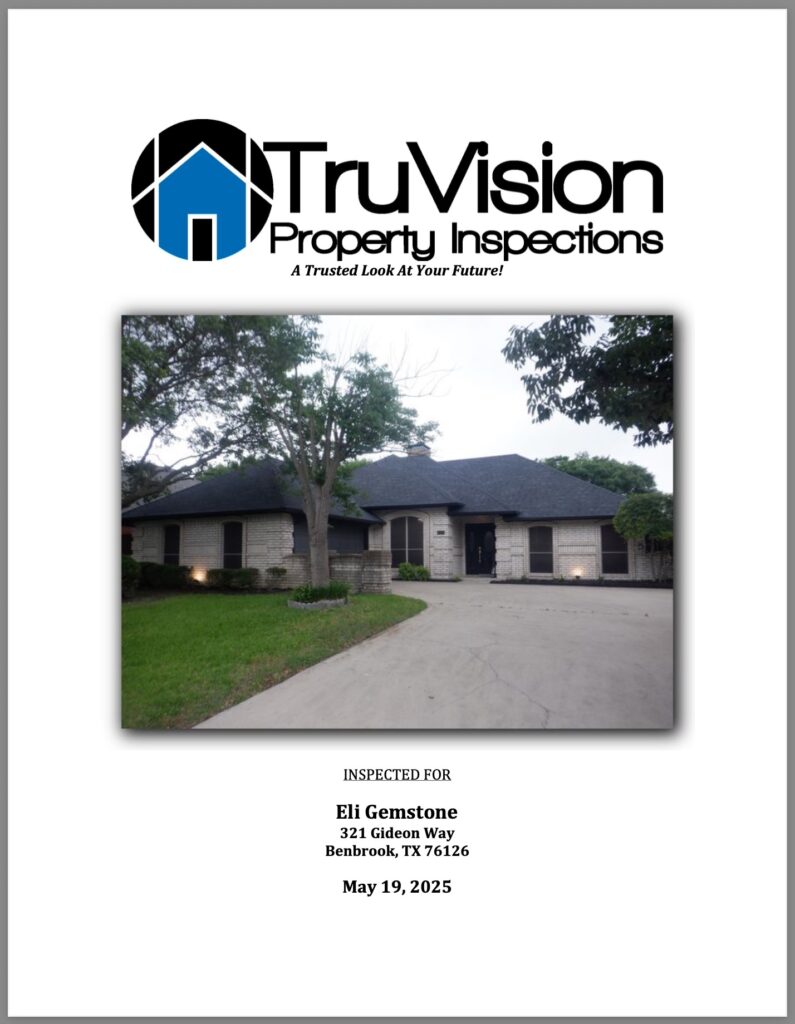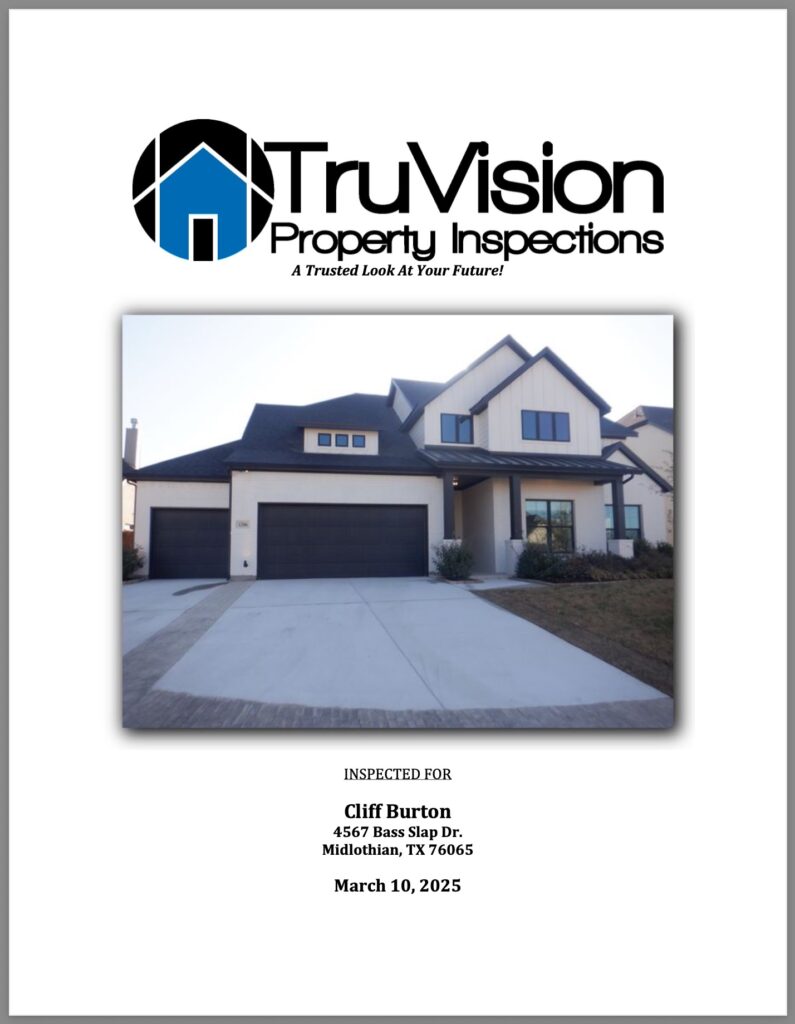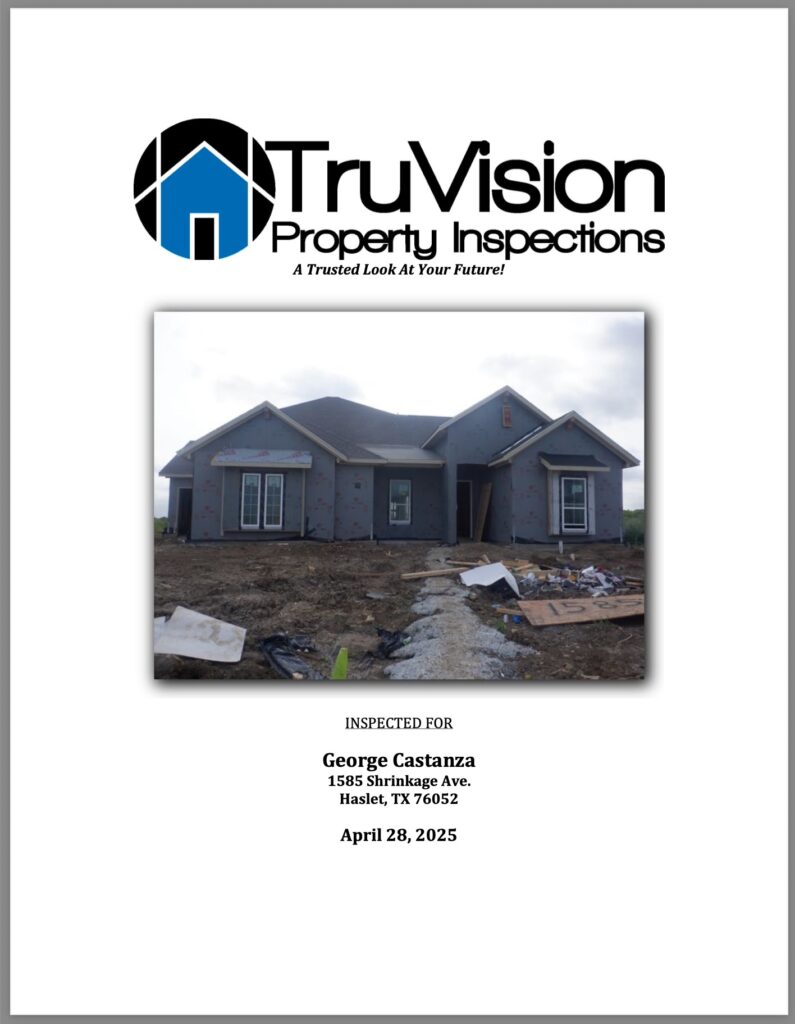WHAT WE DO
Performing residential and commercial property inspections in the Dallas/Fort Worth area, we strive to provide the most thorough and comprehensive inspections for your future home/property! We are licensed by the highest state (Texas Real Estate Commission – TREC) and even national standards, with additional certifications and experience to provide pool & spa equipment (CPO/CPI), infrared or thermal imaging (FLIR Technology), Zip-Level readings for foundation elevation changes and measurements, and WDI (wood destroying insects) or termite inspections through the Texas Dept. of Agriculture (TDA). We strive to make the inspection process simple and easy for you. Please check out our videos and other information on FACEBOOK, YOUTUBE, TIKTOK !
WHAT MAKES US DIFFERENT?
In short, we pride ourselves on giving you the best CLIENT EXPERIENCE possible. And we say CLIENT rather than “customer” because we strive to forge a relationship that lasts long after the inspection is over. We don’t work for anyone else but YOU – providing an honest and objective assessment of the home, setting ourselves apart by EXPLAINING & EDUCATING you about your future home. Ask around – or go check out some of our 5-STAR reviews on FACEBOOK or GOOGLE to find that we consistently exceed our client’s expectations.
MORE WAYS WE SET OURSELVES APART!
* Same Day Reports (see examples below) *
* Licensed WDI/Termite Inspection Services *
* Zip-Level Foundation Measurements/Evaluation *
* Certified Pool/Spa Inspection Services *
* Personal Walk-Through of the Property *
* All Forms of Payment Accepted on-site *
* Irrigation/Sprinkler Inspections Included *
* Thermal Imaging Scan Included *
(Water leaks below carpet & at ceiling in kitchen)
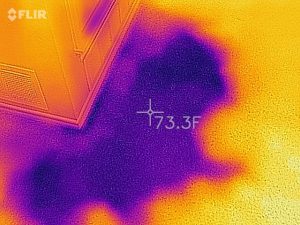

ARE ALL INSPECTORS CREATED EQUAL?
Were all your teachers in school the same? How about your experience buying a car? Well, like any other service or profession, the state standards and requirements are only the starting point in finding a good home inspector. So here are at least four (4) questions you may want to consider asking when looking for a quality inspector…
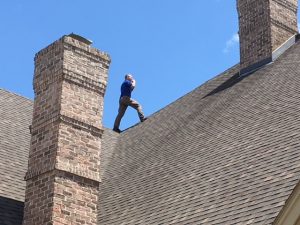
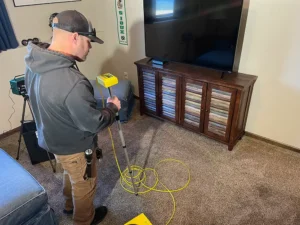
1) How will you be inspecting the roof?
In Texas, home inspectors are NOT required to walk roofs (one of the most expensive components of a home), but simply note from what vantage point they were viewed. But roofs are often like going to a neighborhood car show…”good from far, but far from good“. Without actually getting up on and walking the roof, you can’t gather a true understanding or see the defects that may be present.
2) What extra costs are involved?
Many inspectors charge EXTRA to inspect an irrigation (sprinkler) system, which is present in the majority of homes here in North Texas. Thermal imaging cameras are utilized by most any reputable inspector and VITAL to the inspection process. A good inspector won’t do an inspection without them – and we believe, include it as part of their price quote each and every time. There are even companies that tack on additional fee’s for a personal “walk-through” of the property to show and explain defects. And while components such as pools, septic systems, or additional out-buildings are specific to certain properties (and may be an additional cost) watch out for “ticky-tacky” add-on charges that make an advertised or quoted price $100’s different than what you actually have to pay.
3) What’s your experience?
We all have to start somewhere, but do you really want someone’s first or second inspection to be on YOUR home? With over 10,000 collective inspections performed in the DFW area, we may not have seen it all…but we’ve seen a lot! Experience matters in any profession, but especially when it comes to all the intricacies of a home and all of its components. Find someone who understands, and can help explain (or walk you though) the process as efficiently as possible.
4) What are people saying?
Review your inspector to see what other clients or buyers are saying. While no one is perfect, you can gather quite a bit of information about who you’re hiring, how they conduct themselves, and how they do (or don’t) go above and beyond your expectations!
WHAT ARE PEOPLE SAYING?

– Andrea S.
“I’m the guy who second guesses every decision I make. But I honestly have to say that I truly scored with TruVision Inspections. I learned over time by talking to a dozen home inspectors and hiring a few of them that not all home inspection is going to be the same. He got into places in the house that I thought you couldn’t get into. He’s hard-working, detail-oriented, and extremely focused. He means business. I cannot recommend anyone better. Home inspectors are dime a dozen these days, but Ryan sets the new gold standard in my book.
– Donald K.
“The TruVision team are my favorite inspectors in the business. I am a broker, and Ryan and his team always give us a fair and honest assessment of the homes they inspect. They are very thorough and who you want in your corner when inspecting a home. Can’t recommend them enough! I use them personally too!”
– Rachel P.
HOW DO YOU ACTUALLY DO IT?
FIRST – By providing customer service that’s second to none. We’ll explain what we’ve discovered about the home, and let you know if other professionals should be consulted during your option period. We also want you to join us at the property so that we can physically show you what we’ve found – not simply send you a report that makes you search for things. (**Please CLICK or TOUCH the pictures below to view one of our sample reports).
But we also keep the lines of communication open with you throughout the home-buying process. We’re happy to answer any questions you may have afterward, answering emails, calls, and texts as quickly and efficiently as possible. We again aim to provide an EXPERIENCE that will give you the valuable information you need – and peace of mind for the future!
SECOND – TruVision inspectors go above and beyond the minimum state standards. Crawl spaces are often too small for some inspectors to access, but not for TruVision inspectors. And we won’t just poke our head in the attic, but try to walk and investigate any and every area of the home we can. We look to ensure a quality and thorough inspection, investigating areas of your home you may never see, testing every available outlet, window, and door – items of which require only a “sampling” by the state minimum standards.
(Termites & pier support failure)
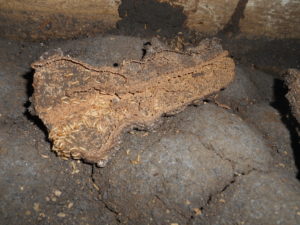
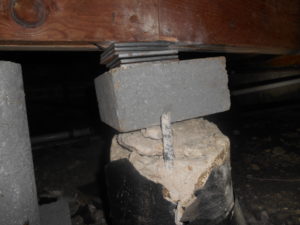
HOW DO I SCHEDULE?
Right now you’re juggling forms and documents that can be overwhelming and cumbersome to sort through. We hope to bring clarity and ease, making it simple and easy to schedule your inspection.
STEP 1 – Contact us by calling/texting (817) 966-0606 or emailing us at Schedule@TruVisionInspections.com . We’ll offer times of availability that work best for you (and obviously fit within your option period).
STEP 2 – We’ll contact the people involved to schedule your inspection. You don’t have to worry about a thing – we’ll handle it all!
STEP 3 – You’ll receive a confirmation email and our inspection agreement that you can electronically sign before we begin the inspection. It’s simple and easy, mobile-friendly for your on-the-go schedule.
STEP 4 – After the inspection is complete, you can pay on-site with cash, check, or charge. We accept all forms of payment and will send your receipt with the finalized report as downloadable PDF documents. And in almost every case, you’ll receive your report on the same day as the inspection!
![]()
![]()
![]()
SAMPLE REPORTS – THE FINAL PRODUCT
**CLICK OR TOUCH THE PICTURES BELOW**
(Inspection Report for a PIER & BEAM Foundation below)
(Inspection Report for a PRE-OWNED SLAB Foundation below)
(Inspection Report for a NEW CONSTRUCTION home below)
(Inspection Report for PHASE (PRE-DRYWALL) Inspection below)
WHAT’S MOST IMPORTANT IN MY REPORT?
Purchasing a new home is exciting, however, it can also bring stress and anxiety as you try to make sure you’re making a sound decision and safe investment in your family’s future. One of the best tools to help you in the decision-making process is your home inspection report. Your TruVision inspection report will contain a wealth of information regarding your prospective home. It will address many facets of the home, as well as its systems and components. It will contain descriptions, photographs, diagrams, and a list of defects ranging from minor and inconsequential items to potentially major issues. It’s a great resource for both your purchase decision and the ongoing ownership process.
Now…all home buyers should understand the “perfect house” does not exist. Every house has defects that range from items that do not meet current building standards, items that need to be replaced, and of course, a “honey-do” list of things you may (or may not) get to months or even years down the road. Fortunately, most of the defects found tend not to be extremely serious can certainly cost money (now or later). Many items are considered “as-built” while others may just have maintenance implications. While we believe that all of these items are important things to know as a homeowner, many of these individual items are not likely to be factors in your purchase decision. Don’t worry about how many items or how many pages are in your report. Focus on the individual items and which ones are truly significant to your purchase decision and negotiating process.
Your TruVision inspector will help you understand the significance of the various report items and your agent can help you with any potential negotiations or follow-ups. And because each family’s needs and priorities are different, it’s important that you read the full report so that you can decide what items are of greatest importance to you. However, the following issues that really matter will typically fall into these categories:
- Life Safety Issues – examples: gas leaks, fire hazards, exposed electrical components, non-supported decks/balconies, etc.
- Major Defects – examples: structural failure or excessive shifting, roofs needing replacement, HVAC system failures, and plumbing (or slab) leaks.
- Progressive Issues (i.e., things that may lead to major defects and secondary damage if not corrected in a timely manner) – examples include most water/moisture-related issues, older aged water heaters, and HVAC systems, cracks that need monitoring, etc.
Anything in these categories should be considered from both the perspective of their COST and URGENCY. Often times a life safety issue, though very urgent, maybe fairly cheap to correct (such as a carbon monoxide detector). On the other hand, an aging roof system might be slightly less urgent but have a high cost associated with the repair or replacement.
Remember…there is NO perfect house. And just because it’s in the report doesn’t mean it has to be fixed (your inspector’s own home has plenty of defects too). Only you can decide what is acceptable or works best for you!
Consumer Protection Notice – Texas Real Estate Commission
MEET THE TEAM

Ryan Cantrell – Owner/Inspector
TREC#21398
TDA#0734039

J. Ryan Miller – Lead Inspector
TREC#21198


